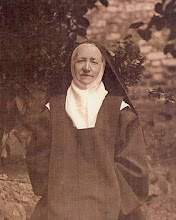Dependence on Jesus Christ.
From Christ, the Carmelite, henceforth, is not to look away; in dependence on Him the Carmelite intends to live. Carmel was searching for God and union with God. Then came the Son of God, God Himself. Turning towards Him, the Carmelite did no more than continue along the path that had always been his. In virtue of an essential and profound continuity Carmel, which is biblical and remains biblical, becomes evangelical.
In fact, born under the Old Testament, formed by the divine Word, Carmel awaits its fulfillment. With Elias and the prophets it watches for "Him who is to come"; it can look at nothing else. It finds that, like the prophets, its natural study is to desire the coming of the Savior, to hasten His arrival.
Filled with the preparation which abounds in the Sacred Books, Carmel turns toward Christ with the certitude of finding in Him all it seeks.
It seeks God as an object of knowledge and love; where then could it better find and embrace Him than in His Son who was made flesh and given to us? Carmel awaits the fulfillment of the divine Word. Now Saint John of the Cross tells us that "God has spoken but one Word and that is His Son".
Carmel has received as a legacy the awareness of the greatness of God, of the nothingness of the creature, and of its divine vocation. How then could it not place all its hope in a Mediator and Savior, all its hope in Christ suffering and dying for us through love?
Nevertheless, considered relatively, Christ's role in the Rule is lightly stressed. Here we are in the presence of one of Carmel's mysteries. It is not easy to grasp: a hidden, half-formulated spiritual reality which is at the same time truly central and profoundly operative.
Beyond any doubt there are other schools of spirituality in which Christ's role is more prominent. He is the model, the exemplar, and His life must be imitated. The spirituality of a contemplative order could never be like that. If it is a question of always looking at Christ, it is also and even more a question of uniting one's self to Him and living by Him. Christ who is the way toward the Father, the author and finisher of our faith, becomes by this fact, the milieu in which contemplation develops, the path it uses. So it would seem the Carmel's Rule is on Christ and that
Carmelite prayer develops in the depths of the life Christ communicates to the soul.
No doubt Carmel is not unmindful of the need of some kind of a method but it seems that those who had asked for the Rule had already made some progress in spiritual life. This is because they had been leading for a long time a solitary, interior and mortified life, and they possessed "a pure heart and a good conscience". Therefore the Rule is more interested in highlighting what must be characteristic of contemplative life: perpetual prayer to which the hermits must dedicate themselves, "these interminable vigils of prayer must make (religious) the Lord's intimate
friends, and love becomes a state of soul".
The Rule does not define the nature of the contemplation toward which it is oriented but it is easy to discover it in "L'institution des premiers moines." This document was long held in the same reverence as the primitive Rule and allows us to understand that this perpetual prayer must make it possible for the Carmelite "in some way to taste in his heart and to experience in his soul the strength of the divine presence and the sweetness of heavenly glory: in other words to drink from the torrent of divine pleasure".
Clearly this is a reference to a mystical experience of God. This is, in fact, the end toward which the Order is oriented. Of course not all reach the goal. But Christ is for all, at least, the path that leads to the goal. And all ought to live "in dependence on Jesus Christ", all ought "to remain in their cells... meditating day and night the Law of the Lord and watching in prayer".
skip to main |
skip to sidebar
This site wishes to promote the spirit and traditions of the Discalced Carmelite Order. It is dedicated to Mother Mary of Jesus OCD (Madeleine Dupont) who did so much to establish Carmel in Britain.
